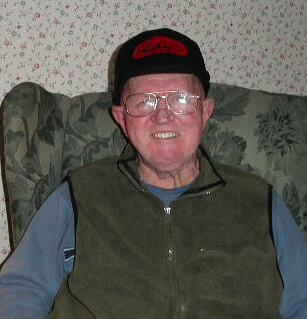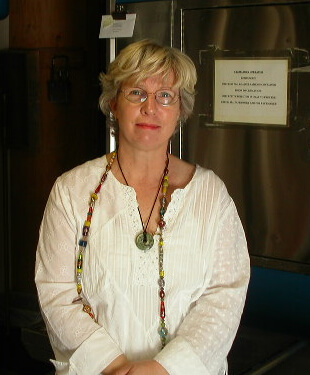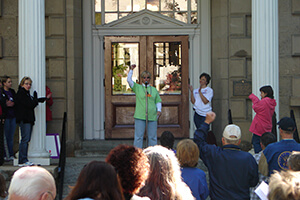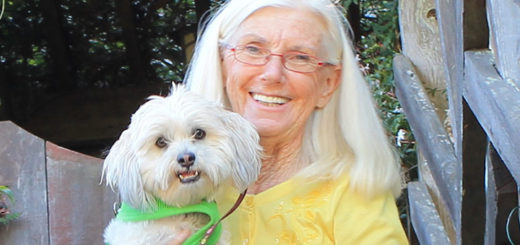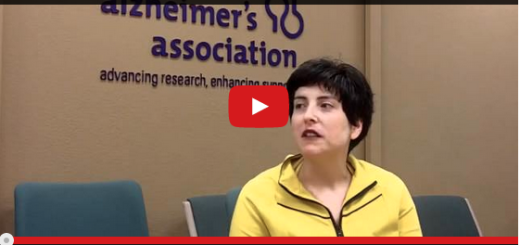Carson City daughter has supported Walk for the past 17 years – in her dad’s memory
When Jenny Haas’ father, Gene Anderson, began showing signs of dementia she thought her father was just getting older. After he received a visit from Adult Protective Services (APS), Jenny’s life was turned upside down as she struggled to find a new home for her father. During his disease, Jenny advocated for Gene’s health and safety until the day he died. After his death in 2006, Jenny found the Alzheimer’s Association Walk to End Alzheimer’s®. Nearly 20 years have gone by, and Jenny continues to support the Walk in Sparks in the hopes of finding a cure.
Riding a ladder down
Jenny Haas was very close with her dad, Gene Anderson. When his other daughters grew up and moved away, Jenny continued to live nearby. “My dad and I, we ate ice cream and listened to Kris Kristofferson tapes,” shared Jenny. “I was his Princess Poop Poop a Doop. He had names for all of his girls.”
Sometime during the 1980s, Gene was working as a painter when his ladder slipped out from under him. He only had two choices, either jump onto concrete, or ride the ladder down. He chose the latter option, where he hit his head which resulted in hearing loss and a brain injury. This injury mimicked a stroke where he lost his ability to understand or express speech, commonly known as aphasia.
Forgetting the soup
Memory loss that disrupts daily life may be a symptom of Alzheimer’s. A person living with the disease may put things in unusual places or lose things and be unable to go back over their steps to find it again. Another sign of Alzheimer’s can include changes in judgment or decision-making. For example, they may use poor judgment when dealing with money or pay less attention to grooming or keeping themselves clean.
After his injury, Gene returned home to return to life as normal. Despite the aphasia, Jenny was able to understand and communicate with her dad. Several years later, when Gene started to do “funny things” like repeating stories or taking apart his razor for no reason, Jenny and her sisters just thought their father was getting older. Neither of them thought it might be dementia.
“There would be a mug in the microwave beeping,” said Jenny. “It had been in the microwave with soup for days. He couldn’t hear [the beeping] and didn’t remember it was there. He started wandering a bit and peeping in neighbors’ windows. We attributed it to Dad being Dad. In hindsight those were the signals or red flags.”
Still assuming this was normal age-related behavior, Jenny and her siblings helped solve her dad’s problems. When Gene could no longer cook, they set up Meals on Wheels. When Gene stopped being able to safely drive, they took away his keys. It wasn’t until Gene went to the bank and took out a large sum of money did Jenny realize there was a problem.
A visit from APS
Because of his brain injury and aphasia, getting a dementia diagnosis was impossible. Since this was the late 1990s there wasn’t much testing to be done and the aphasia made it impossible for Gene to answer questions correctly, even if he knew the answer. “We couldn’t do cognitive testing because he was hard of hearing and had aphasia,” said Jenny. “What day of the week is it? He might think it’s Tuesday and then cantaloupe comes out.”
In late 2003, Gene’s apartment manager noticed that Gene was continuously going outside to take out the trash without wearing a sweater. Concerned for his safety, the manager called APS. When someone came out to speak to Gene, because of the aphasia, he couldn’t communicate effectively, and APS deemed it unsafe for him to live alone.
Jenny and her younger sister began the hunt for a care setting that their father could move to. They were pleased to find a beautiful place nearby where he would have a private room. Jenny and her sister began to pack up their father’s life, and, to their surprise, Gene helped out too. When the moving truck arrived, Gene happily packed all of his belongings into the truck, eager to be on his way.
However, when they got to Gene’s new home, things changed. “He helped us pack up his stuff and move him out,” said Jenny. “He had thought my sister was moving there. He was furious with us. He threatened to call the police and a lawyer.”
The staff assured Jenny and her sister that this was a normal behavior and can sometimes happen. The staff suggested the women should just leave and eventually Gene would calm down, and much to their surprise, the staff was right. Gene got used to living in his new home. He was well liked at the care setting and would sit on the couch looking out the window for Jenny’s white car.
Wandering
Six in 10 people living with dementia will wander at least once; many do so repeatedly. Alzheimer’s disease causes people to lose their ability to recognize familiar places and faces. It’s common for a person living with dementia to wander or become lost or confused about their location.
As the disease progressed, Gene needed more support than his current care setting could provide. He even forgot who Jenny was at one point. “I was sitting on the couch [with my dad by the] front by the windows,” said Jenny. “My dad says to me ‘Pretty soon my Jenny is going to come in that door,’ and I said, ‘You bet she is dad, she’ll be here.’”
By 2006 Gene had begun to wander away from his care setting, managing to walk miles away before being found. This was the final straw for the staff and he was asked to leave. Jenny and her sister did the best they could to find a new home for their father and they moved him into a convalescent home.
Despite warning the convalescent home about Gene’s wandering, on his first night there he tried to leave. “A nurse tried to back him into a corner,” said Jenny. “He hit the nurse. After that he was considered a combatant. They medicated him and put him in a wheelchair with straps. Within in six weeks he had degraded so badly.”
It wasn’t long before the convalescent home asked Gene to leave due to his wandering. “They knew he had dementia; they took him in, and then they didn’t want him,” Jenny shared angrily. “They wanted to send him to an institution in Utah. I couldn’t visit him in Utah!”
“Good Night Irene”
Luckily, Jenny found a place in Fallon, Nevada that had a secure section so Gene couldn’t accidentally wander off. Despite the better living conditions for Gene, the disease had progressed too far. “I got the call that my dad was sick and needed to go to the hospital,” said Jenny. “I had a [Do-not-resuscitate order] (DNR) in place for him and I said, ‘Do not take him to the hospital. They will try to keep him alive.’ The doctor [told me that my] dad was dying and prescribed [medicine] to help keep him comfortable.”
Jenny wanted her siblings to get a chance to say goodbye. She bought a few pay-as-you-go cell phones so that everyone could sing “Good Night Irene,” a bar song that the family had turned into a funny family song. After the song was over Jenny drove back to her home in Carson City, and while eating dinner received a call from the care setting informing her that her father most likely would not last through the night.
Rushing back to see her father, she was able to sit with him and hold his hand while he was still alive. Eventually Jenny couldn’t keep her eyes open any longer. She laid down on another bed in the room and Gene died while Jenny slept.
When Jenny called her sisters to let them know their dad had died, she found she couldn’t say the words, and instead she sang “Good Night Irene” knowing they would understand. When the mortuary came to take Gene away, Jenny assisted in every way she could to make sure her dad was cared for, all the way to the end.
Looking for the white flower
That same year Jenny found Walk to End Alzheimer’s. At the time it was held in Carson City but has since merged with what is now the Reno-Sparks Walk. Walk to End Alzheimer’s is the world’s largest fundraiser for Alzheimer’s care, support and research. This inspiring event calls on participants of all ages and abilities to join the fight against the disease.
Over the years Jenny has watched the Walk grow in size, and she says, grow in hope. “It seems like there are thousands of people at the Sparks Marina,” said Jenny. “It’s an amazing event. It seems like there is more hope for some reason.
“It was my crusade for a long time to keep the awareness [of the disease] going. To keep participating even if I’m the only one there. I was there every walk. I flew the colors like a proud flag. Something has to be done, there has to be a cure. Every time there’s another new pill and the FDA is approving it, I think ‘Let this be the one to save the rest of us. It is a horrible disease.’”
The funds raised for Walk fuel the mission of the Alzheimer’s Association® and help advance critical care, support and research. “A cure takes money,” said Jenny. “It doesn’t happen for free. The funding has to be there. To support the Association for the work they do, to be there to answer the phone [for the 24/7 Helpline (800.272.3900), the brochures, the support is just phenomenal. That’s huge for caregivers and people to have that support.
“The Walk is so inspiring. When you see the flowers raise up and [you see that] all these people are caregivers or know someone [living with the disease]. The people [living with the disease] speak and you just wait for that white flower [which represents the first survivor of Alzheimer’s disease] to be raised. It’ll happen, I know it’ll happen, I just hope it happens in my lifetime, so I can be a survivor too if it ever comes to me.”
You can join Jenny’s team, Harrah’s HERO’s – NNV or start your own team for Walk to End Alzheimer’s – Reno-Sparks on October 14 at the Sparks Marina. Not in Northern Nevada? Visit alz.org/walk to find a Walk near you.





